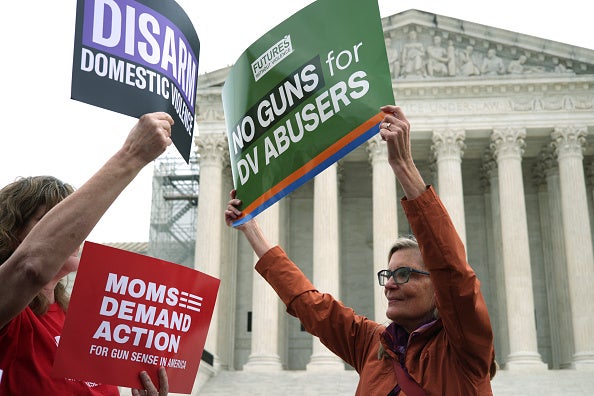Clarence Thomas thinks domestic abusers should be allowed to carry guns
He was the lone dissent in a Supreme Court ruling that upholds a ban on firearms for domestic violence offenders
Your support helps us to tell the story
From reproductive rights to climate change to Big Tech, The Independent is on the ground when the story is developing. Whether it's investigating the financials of Elon Musk's pro-Trump PAC or producing our latest documentary, 'The A Word', which shines a light on the American women fighting for reproductive rights, we know how important it is to parse out the facts from the messaging.
At such a critical moment in US history, we need reporters on the ground. Your donation allows us to keep sending journalists to speak to both sides of the story.
The Independent is trusted by Americans across the entire political spectrum. And unlike many other quality news outlets, we choose not to lock Americans out of our reporting and analysis with paywalls. We believe quality journalism should be available to everyone, paid for by those who can afford it.
Your support makes all the difference.The Supreme Court has upheld a law designed to keep firearms out of the hands of domestic abusers.
The court’s 8-1 ruling in United States v Rahimi on Friday holds that “when an individual has been found by a court to pose a credible threat to the physical safety of another, that individual may be temporarily disarmed consistent with the Second Amendment.”
The only dissent came from conservative Justice Clarence Thomas, whose 2022 decision in a major Second Amendment case vastly expanded gun rights and opened the door for lawsuits across the country that tried to tackle the profliferation of firearms and severe rates of gun violence.
Friday’s decision is a sigh of relief for survivors of domestic abuse, and a “powerful reminder that the gun lobby cannot — and will not — be the arbiter of the lives of women and families across the country,” according to Angela Ferrell-Zabala, executive director of gun violence reform group Moms Demand Action.
Zackey Rahimi pleaded guilty to violating a law that required him to relinquish his firearm because he had been subject to a two-year restraining order.
But instead of giving up his gun, he was involved in five shootings in a two-month span.
Rahimi argued that federal law violates his constitutional right to own a firearm, a decision affirmed by the right-wing-dominated Fifth Circuit federal appeals court just 15 days after the Supreme Court handed down a major decision in another landmark Second Amendment case.

The Supreme Court had made it easier for people like Rahimi to bring Second Amendment lawsuits after the conservative majority overturned a New York state law that restricted people from obtaining concealed-carry licenses.
That decision — written by Justice Thomas — established a new test for gun-restricting laws: they must be “consistent with the Nation’s historical tradition of firearm regulation.”
The explosive 2022 ruling in New York State Rifle & Pistol Association v Bruen has changed — if not confused — the way that courts across the country have interpreted laws intended to curb the proliferation of firearms across the US in the grips of a growing gun violence crisis.
With that new standard in place, a three-judge panel from the conservative Fifth Court of Appeals unanimously took Rahimi’s side.
During the Supreme Court’s oral arguments in November, Rahimi’s lawyer, Michael Wright, argued Rahimi should be allowed a firearm because there was no historic tradition of firearm bans for people without felony convictions.
But justices weren’t convinced that argument was strong enough to put guns in the hands of abusers.
Solicitor General Elizabeth Prelogar raised concerns about the impact on survivors of abuse, noting that women are five times more likely to be murdered if their partner has access to a gun.
There is also “legislative consensus,” as 48 states and territories share the view that disarming abusers is an appropriate response to protect survivors, she said.
Those protections combat “a profound harm,” as a body of evidence and harrowing statistics underscore the lethal intersection of domestic violence and gun ownership, she argued.
“I know how important today’s Supreme Court ruling is because I have lived it,” said gun violence survivor La’Shea Cretain, a member of Everytown for Gun Safety and a volunteer with Moms Demand Action.
She recovered from a coma and still lives with all five bullets in her body.
“While the Supreme Court reached the right conclusion today, the fact that this extreme case made it this far only underscores why we cannot let our foot off the gas in the fight to protect women and families from gun violence,” she said in a statement. “Today, we celebrate but our fight for justice does not end here.”